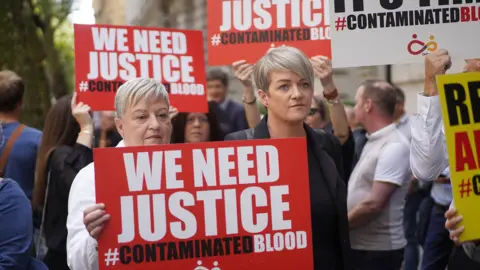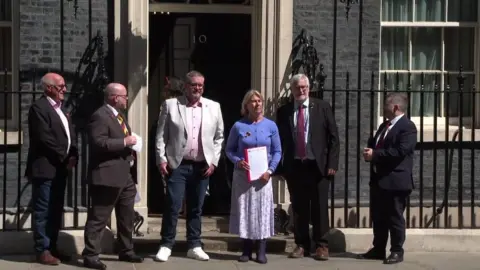Infected blood victims call for faster compensation
 PA Media
PA MediaCompensation for infected blood victims needs to be delivered faster, campaigners have said on the first anniversary of a public inquiry report into what has been described as the worst treatment disaster in NHS history.
"We are dying at pace, the government needs to be working at pace, not just talking about it," one campaigner said on Tuesday as a letter calling for action was handed in to the prime minister.
Diana Johnson, a minister who for years as a Labour MP supported victims of the scandal, said it was "disappointing" to hear how slow process had been.
But Cabinet Office minister Nick Thomas Symonds said the government was "committed to delivering compensation as swiftly as possible".
More than 30,000 people in the UK were infected with HIV or hepatitis C or both after being given contaminated blood products in the 1970s and 1980s. Around 3,000 people have died.
In his final report released one year ago, inquiry chair Sir Brian Langstaff said the scandal had been largely avoidable and involved systemic failings.
Campaigners had expected rapid compensation, but so far only 100 people have received payouts.
They gathered at Westminster on Tuesday to hand in a letter to Sir Keir Starmer, stating their concern at the lack of progress.
"Twelve months on from the publication of the Infected Blood Inquiry's devastating report, there remains deep concern from the contaminated blood community that politics is continuing to fail them," the letter said.
"As the Infected Blood Inquiry heard when it reconvened hearings on 7 May 2025, the community's voice was absent when the Infected Blood Compensation Scheme was drawn up. The resulting scheme contains fundamental flaws, which could and would have been foreseen."
 PA Media
PA MediaSpeaking exclusively to the BBC, Diana Johnson MP, who is now a Home Office Minister, told BBC News that she appreciated the concerns of campaigners and sympathised with their argument.
"It's disappointing to hear just how slow the process is though, and I fully appreciate the concerns that so many people who are gathered today are making about wanting to get those payments out to people," she said.
"We know on average someone dies every couple of weeks, so this has to be paid. But the money is there."
When asked whether she could use her position as minister to make their case she said she was speaking to the BBC as a constituency MP.
Jacqueline Wrixton, who was infected with hepatitis C as the result of a blood transfusion, said: "It's been a year since the euphoria of the recommendations, and yet, as an infected person... the statistics that roughly two a week are dying, we've still not got payment.
"We are dying at pace, the government needs to be working at pace, not just talking about it. We need to see the actions."
Cabinet Office minister Thomas–Symonds said: "The victims of this scandal have suffered unspeakably.
"After decades of delay, it has fallen to this government to act. We are acting on the inquiry's 12 recommendations, so that this never happens again, and to get justice for victims.
"While no amount of compensation will make up for the suffering people have endured, we are committed to delivering compensation as swiftly as possible."
